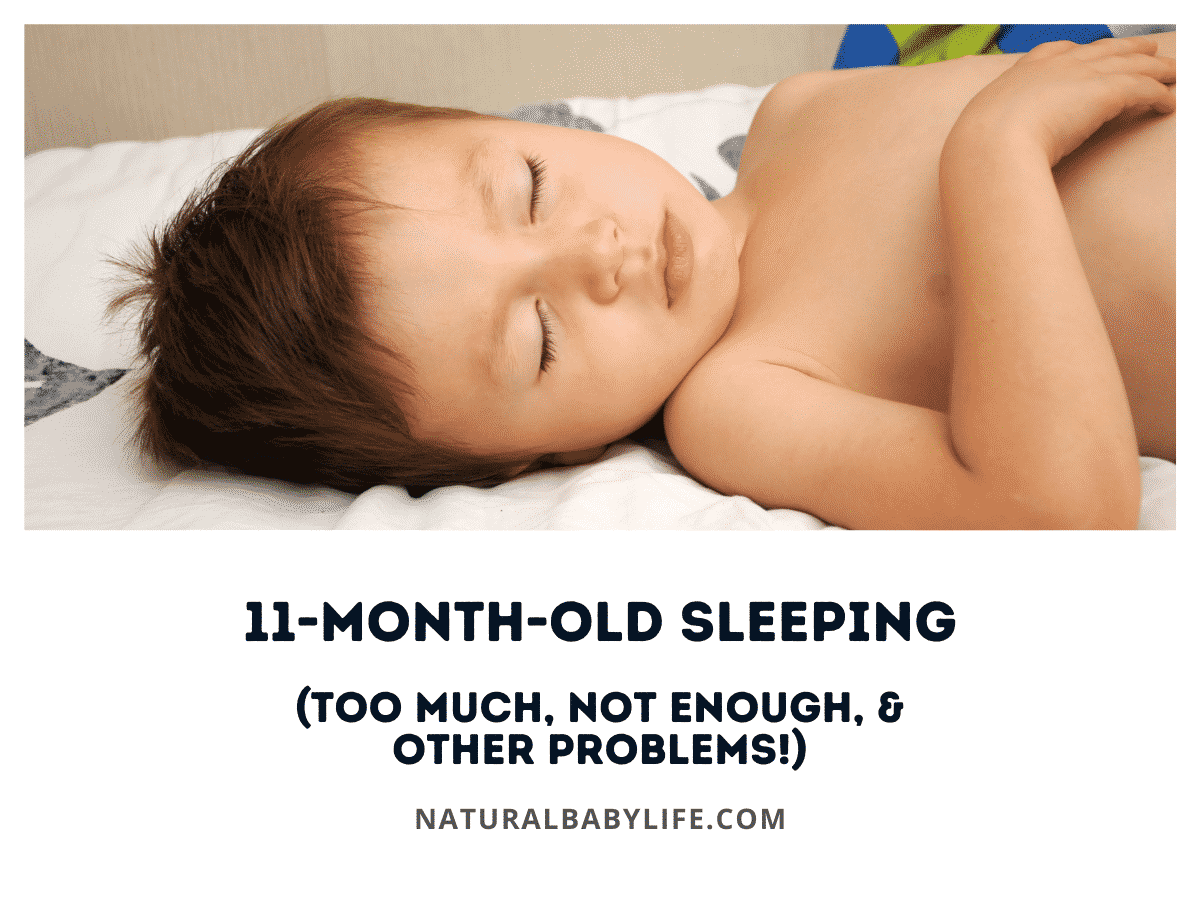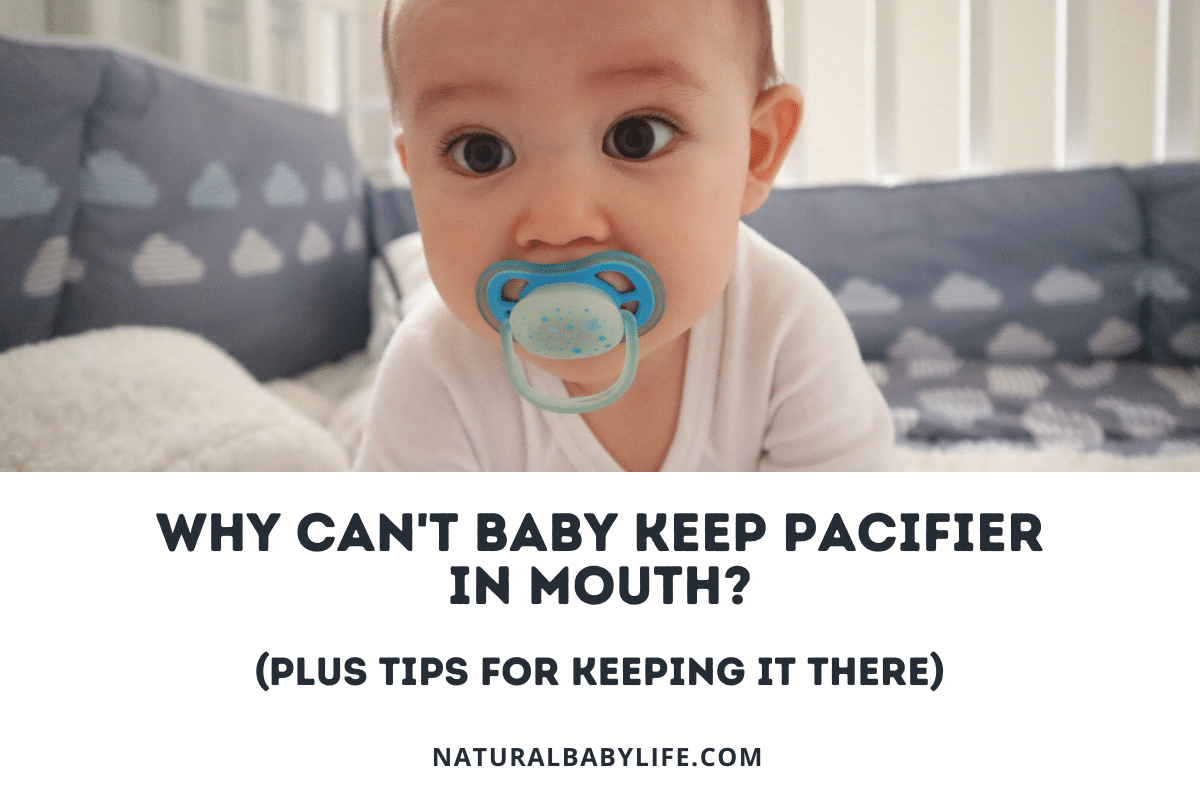Sleep is vital to both parents and babies alike, but as your baby gets older, the amount of sleep needed changes. What should your 11-month-old’s sleep schedule look like?
An 11-month-old baby should be sleeping around 14 hours a day, including naps. Typically babies around this age sleep for around 11 hours total during the night followed by 3 hours of naps during the day. Many parents will opt to do two 1.5 hour naps while others may attempt a complete 3-hour nap.
Learn more about your baby’s sleep and how to help navigate through sleep problems and regressions.
Table of Contents
What is a normal 11-month-old sleep schedule?
Many parents stress out about what is normal in terms of sleep for their babies. What is a good sleep schedule for an 11-month-old?
At 11 months old, babies need about 14 hours of sleep during the day, including naps. It’s typically recommended they sleep for about 11 hours total during the night, although your baby may not be sleeping through the night. Babies should still be napping at this point for about 3 hours during the day in either one or two naps.
This amount of sleep your baby needs is cumulative, so your baby’s exact schedule will differ based on his sleep patterns. Some babies may sleep less during the night at 9 or 10 hours but may end up taking longer naps during the day, maybe even a third nap depending on the baby.
Pay attention to your baby’s cues to see if you need to make adjustments. If your baby is struggling to stay awake at dinner time, you may need to adjust his nap time hours. If your baby is still wide awake and ready to play at two hours after bedtime, it may be time to make changes to his naptime.
11-month-old sleep regression
What happens if your baby is waking up in the middle of the night or is waking up constantly? What is happening?
Sleep regression is a shift in sleep patterns, often leading to your baby waking up in the middle of the night and having difficulty going back to bed or even staying asleep. These happen at 4 months, 6 months, 8 months then what’s considered the 12-month regression (usually between 10-12 months). The average age for this is 11 months old.
Sleep regressions can last around 3-6 weeks. During this regression, many babies will start refusing to sleep, or they will wake up repeatedly during the night.
Here are some common factors leading to sleep regression at 11 months old:
- Growth spurt
- Teething
- Reaching milestones such as walking or talking
- Separation anxiety
- Nightmares or night terrors
- Illness
11-month-old suddenly refusing sleep
Many parents are frustrated because their normally wonderful sleeper is now refusing to sleep and they cannot understand why and struggle with how to help him.
Refusing to sleep is one of the signs your 11-month-old is experiencing sleep regression. He wants to play or he wants hugs and attention instead of going to bed. You may need to try different techniques when figuring out how to get your baby to sleep. Some things you can try are to change his bedtime, adjust nap times, or adjust bedtime routines.
Babies will also refuse to nap during this time, which means you may need to look at their nap times and rework them to have a longer stretch of awake time in between their nap and dinner time. If he’s napping from 1 pm to 3 pm and bedtime is at 7:30, he may need to either have a shorter nap or a later bedtime in order to be awake longer.
Adjusting their bedtime routine can also be beneficial. If your routine leaves your baby more energized than sleepy, you may need to start earlier or do quieter activities such as reading a book right before bed or maybe giving him a chance to lie in bed before going to sleep. You might also need to take out anything distracting in the bedroom.
11-month-old keeps waking up at night
Some babies may suddenly start waking up in the middle of the night after months of sleeping through the night.
Having your baby wake up throughout the night can be challenging and your first response might be to go to him immediately. For an 11-month-old, you can give it a couple of minutes before going into their room to give him a chance to self-soothe. Offer comfort with soft words and try not to rock or feed him.
Rocking, cuddling, and feeding your baby during these wake-ups could potentially wake him up more if he is fussing in bed, making it even more challenging to put him back to sleep.
Try laying him down on his back and rubbing him gently on his tummy to help soothe and encourage him to go back to sleep. Repeat this as often as necessary until your baby is back to sleep.
Why do babies suddenly cry in their sleep?
Some babies may suddenly cry out in their sleep, not fully waking. What causes that?
Your baby may suddenly cry out in his sleep for different reasons, including transitioning from one sleep cycle to the next, having a mental growth spurt, or even maybe having a nightmare. When you hear your baby cry out in the middle of the night, give it a few minutes before going in to check on him since he will fall back asleep.
At 11-months-old your baby is growing more and more aware of the world around him, and his mind is processing information while he sleeps. By giving your baby a chance to self-soothe, you decrease the chances of him fully waking up during this time. If the crying gets more intense, however, you should check on him.
What if your 11-month old cries when put in the crib?
Some babies may start hating to be put into their crib. Why and what can you do?
One of the biggest reasons babies may hate to be put in their cribs at bedtime is due to separation anxiety. He desires to be with his parents and is beginning to understand that they still exist when they’re not in sight. To help with this, set a bedtime routine that is calming for your baby and helps with the transition.
A routine will help get your baby settled down and ready for bed. If your baby continues to cry after being put in the crib, you may need to go back to sleep training.
What if your 11-month old cries before bed?
Your baby may start crying before bed. Why is this happening?
Just like if your baby cries when being put in the crib, your baby may cry before bedtime because he does not want to be separated from you. It is important to have a good bedtime routine and a set bedtime to help ease your baby into the transition.
You could also give him a few extra minutes of attention to help put him at ease.
How to get an 11-month-old to sleep through the night
What can be done to help your baby sleep through the night?
There are many ways to help your baby to sleep through the night. Doing these things can help ease your baby into having regular bedtime habits and help him sleep through the night. There is no one right way to do this so start with a single change and adjust as needed, by altering times or making changes to your routine.
Here are some ways to help get your 11-month-old to sleep through the night:
- Bedtime routine
- More activity during the day
- Give adequate time for naps
- Avoid stimulus before bed
- Adjusting naptime and/or bedtime
- Know your baby’s sleepy cues
- Stick to a set bedtime
Bedtime routine
One of the best ways to help your baby stay asleep through the night is to have a set bedtime routine.
This will help send signals to your baby that the day is ending and it is time to sleep. Even if your baby fights it during the sleep regression, his body is understanding that it is time for bed.
The routine should be consistent and follow the same order each night. For many families this bedtime routine starts after dinner, starting with bathtime, jammies, and storytime before being put to bed.
Increase activity during the day
If possible, try to increase activity during the day to get your baby tired enough to fall asleep at night.
Activities do not need to be elaborate, with something as simple as an extra walk after work or time playing together could help your baby get more tired.
Give adequate time for naps
Increased activity can help get your baby tired, but you need to ensure he is getting enough time for naps.
An 11-month-old needs about 14 hours of sleep a day with around 3 hours for naptime, and without that, your baby will become overly tired.
An overtired baby will fight sleep far more than one who has had enough rest during the day.
Avoid stimulus before bed
Try to avoid overstimulation before bedtime, such as playing chasing games or having screen time to ensure your baby is calm before putting him down for bed.
Overstimulation will make it more challenging to put your baby to sleep since he would be more wound up and would need to settle down again. Calm activities could be reading a book or singing soft, quiet songs before bedtime.
Adjusting naptimes and bedtimes
If you notice that your baby is continuing to struggle with bedtime, you may need to adjust the times in order to have a long time between his last nap and bedtime. It may mean pushing bedtime back or moving naptime forward.
Give it a few days once you make a change and if you are not seeing improvement, adjust accordingly.
Know your baby’s sleepy cues
Watch for your baby’s signals that he is starting to get sleepy.
Yawns, getting overly fussy, and rubbing eyes are all signs that your baby is tired and needs to go to sleep soon.
Take note of when that is happening so you can work your bedtime routine around that.
Stick to a set bedtime
Having a set bedtime helps keep your family on a set routine.
If you have been watching your baby’s cues, you know when he’s getting tired and can set your bedtime routine around that.
Don’t be afraid to adjust that time as needed though since 8:00 might be ideal on paper, but in reality 8:30 works better for your baby.










